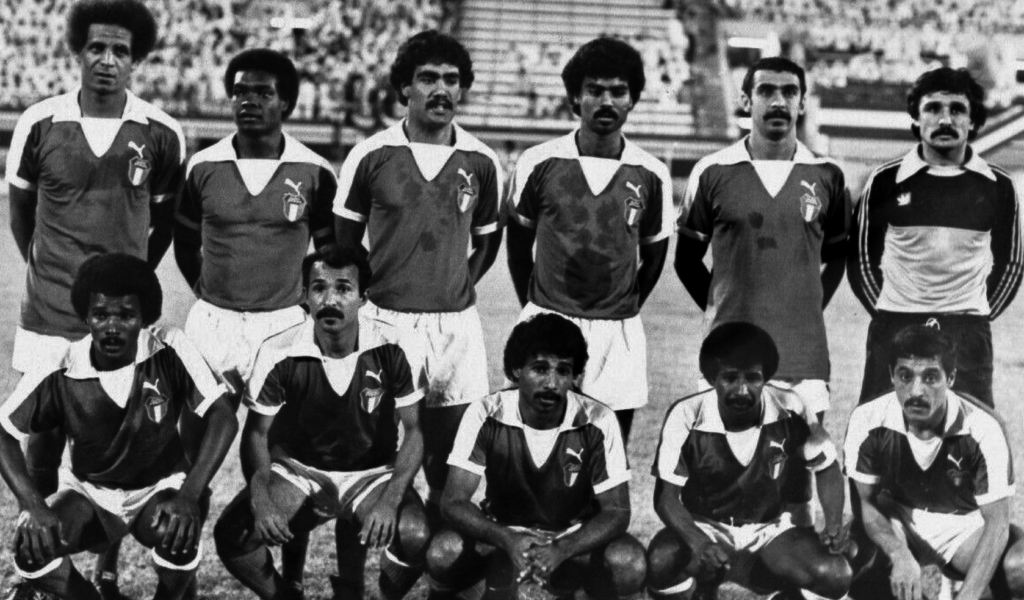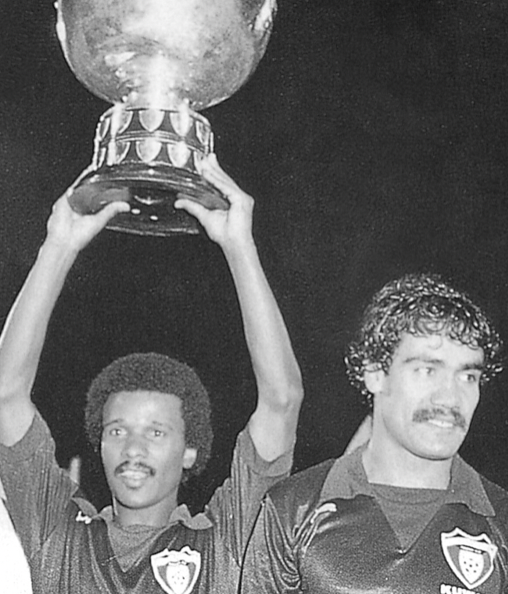The first Asian Cup of the 1980s saw the end of Iran’s dominance of the tournament as matters closer to home took their toll, with Kuwait repeating the benefits on home soil.
1980 Asian Cup
Winner: Kuwait
Runner-up: South Korea
Hosts: Kuwait
The tournament had increased in size to accommodate eight qualifiers alongside the hosts Kuwait and the reigning, three-time champions Iran, fresh off a successful debut at the 1978 World Cup.
Four qualifying groups were set up, with the idea of each group having Group allocation matches, a group stage and a knock-out tournament to decide the two qualifiers from each group.
However, as with previous tournaments, there were withdrawals as nations either couldn’t afford to enter the competition or were affected by political issues that forced their withdrawal, with 14 teams in total withdrawing.
This included Bahrain, who abandoned their first Group 1 match against Syria while losing 1-0 and promptly pulled out of the remaining games, giving United Arab Emirates and Lebanon 2-0 walkover wins.
Syria were not affected by this, winning the group while remaining undefeated and sending Lebanon out after a 1-0 win which put UAE through as the other qualifying team for their debut tournament.
Group 2 was badly affected by withdrawals, with only three teams making it to the start line. This meant that there would be two brand new entrants into the Asian Cup as Afghanistan, Bangladesh and Qatar fought it out for two places in the qualification tournament in Bangladesh
Qatar proved the strongest of the three and qualified undefeated, with three wins and a draw, leaving Bangladesh and Afghanistan with a winner-take-all clash in Dhaka to see who would make it to Kuwait. It wasn’t even close, however, as home advantage drove Bangladesh to a 4-1 win that sent them to the finals.
Group 3 saw just a couple of withdrawals, meaning that the full qualification tournament could take place. It proved to be a tough tournament for all involved, with the Semi-finals being contested with Malaysia vs. Hong Kong and Thailand vs North Korea.
The semi-finals were tight, tense and dour affairs, with North Korea just doing enough to beat Thailand 1-0 and Malaysia qualifying for their second finals, but only after a goalless 120 minutes and a nervy 5-4 penalty shootout win. North Korea won the final 1-0, but both sides were able to celebrate qualification for Kuwait.
Group 4 was a lot more straightforward and the top order was re-established as South Korea and China PR won easily against Macau and the Philippines, meaning that both had qualified with a game to spare. South Korea won the dead-rubber match 1-0 to top the group and return to the Asian Cup after missing 1976, while China reached their second tournament.
15 days of football awaited the 10 teams, with all games from the two groups and knockout stages taking place at the Sabah Al-Salem Stadium in Kuwait City.
In Group A, tournament debutants Bangladesh looked to have saved a point against fellow debutants North Korea after coming back from 2-0 down with a Kazi Salahuddin goal in the 88th minute, only for Kim Jong-man to break Bangladeshi hearts in the last minute.
This was as good as it got for Bangladesh, as after they were edged out 1-0 by the Syrians, they ran into an onslaught from defending champions Iran and China PR, losing 7-0 and 6-0 respectively.
China’s 6-0 win was merely a consolation win after a disappointing campaign where despite drawing with Iran, they lost early on against North Korea, then were eliminated after a Jamal Keshek goal gave Syria a 1-0 win.
Syria made a great account of themselves in their first tournament, holding Iran to a goalless draw on top of the two tournament wins and were unlucky not to qualify for the Semi-finals when they lost 2-1 to North Korea in the final group game.
North Korea, four years after withdrawing from the 1976 tournament at late notice, adapted well to their first finals, only losing to Iran in the group stage and only missed out on topping the group as Iran had a greater goal difference.
For the Iranians, the pursuit for four championships in a row was to be affected by issues nearer to home, with news reaching the players that Iraq had invaded Iran, sparking an eight-year war that made matters like sport seem very trivial.
Morale within the Iranian camp was not helped by the hosts Kuwait, who had voiced their support for the invasion by Iraq and went as far as to air pro-Iraqi propaganda on the national TV stations.

Kuwait – under a young Brazilian coach Carlos Alberto Pereira – had struggled to get out of Group A, only getting through in second place after beating Qatar 4-0 in the final group game. They had managed to beat Malaysia, but a draw with the UAE and a heavy defeat by South Korea put them in danger of not making it out of the group stage.
Malaysia were the team to miss out on the Semi-finals, the draw against Qatar leaving the door open for Kuwait. They had lost to the Kuwaitis earlier on, but a win against the UAE gave them hope of qualification.
For Qatar and the UAE, they came with hopes of doing well in their first Asian Cup, but Qatar’s only win was against the UAE and heavy defeats by Kuwait and South Korea sent them home after the group stage, with UAE joining them in departures after a draw against Kuwait was their only reward for their efforts from four games.
Both semi-finals featured emotionally charged games as Iran took the field in a state of disarray against the hosts who had not helped matters with the pro-Iraqi rhetoric in the media, while the two Korean nations came together with a place in the final at stake.
A repeat of the 1976 final started the day as Kuwait looked to end Iran’s dominance of Asian football in front of a capacity crowd. Iranian minds, however, were not entirely focussed on the game, especially with news that star players Hassan Roshan’s brother had been killed in the attacks in Iran, so it was not surprise that Kuwait had the better of the chances and took the lead after an hour, before Faisal Al-Dakhil made the game safe with a well-taken goal five minutes from the end.
Iran got a consolation goal through Hossein Faraki, but this game proved to be the end of their dominance of the Asian game as they suffered their first ever defeat in the Asian Cup after a tense, bad-tempered and politically-charged match.
South Korea and North Korea, two countries still technically at war, played a second Semi-final that also had massive political undertones, but also gave the tournament a dramatic game with a surprising finish, as North Korea took the lead from a Pak Jong-hun penalty just 19 minutes in and looked set to take on Kuwait, before Chung Hae-won found space to equalise with 10 minutes to go, then sent the southern half of the Iberian Peninsula into joyful ecstasy with the winner in the last minute.
The Third-place playoff was a sombre affair the next day as both sides went through the motions before the journey home. Despite worries about the developing situation at home, Iran did a professional job and claimed third place with a clinical 3-0 win.
The next day brought another capacity crowd to the Sabah Al-Salem Stadium as Kuwait went for their first Asian Cup against a South Korean team looking for their first cup in 20 years.
South Korea had won the 1960 tournament on home soil, so understood the power of home advantage. This was to prove fatal for their chances as Sa’ad Mohammed Al-Houti scored first with an opportunist strike after nine minutes, then Al-Dakhil swept home from close range to put Kuwait 2-0 up at half-time.
South Korea tried to find a way through and organised Kuwaiti defence, but their emphasis on attack cost them as an attack was snuffed out, then quickly sent up the pitch where Al-Dakhil was put through to slot home the third and secure Kuwait’s first ever Asian Cup and ensure the trophy stayed in the Arabian gulf for another four years.


